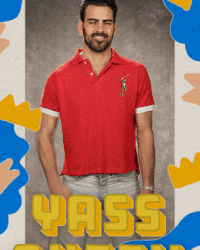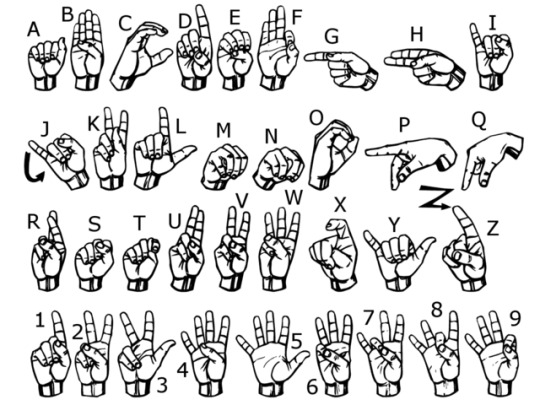21, American Sign Language and Deaf Studies student. To me, the building blocks of being an ally is the acknowledgement of your privilege, the admittance of your lack of knowledge and your fight to support others. This is just the beginning my life long journey of learning the culture, a new language and how to be a strong ally. Click Link titled "Jordyn's Personal Blog Posts" to see my blog posts
Don't wanna be here? Send us removal request.
Text
A Reflective Writing on the movie “In the Land of the Deaf”
In the Land of the Deaf directed by Nicolas Philibert depicts the education of the Deaf in France in its rawest form. Philibert displays an array of clips that demonstrate the heart wrenching and distressing nature of the education of the Deaf. Although this film is set in France in 1990’s, the various modes of oral education and the prevalent themes of isolation, lack of accessibility and audism are still a universal experience for an appalling number of Deaf people worldwide. Therefore, Nicholas Philibert’s goal for this documentary was “to let those people about whom we know nothing speak for themselves” (Philibert, 1991). The many individuals featured in this film share their various stories and experiences with deaf-hood. Philibert showcases a diverse assortment of culture, age and religion, but this does not diminish from the overall theme of oppression and audism that these individuals have faced throughout the many stages of their lives. The Deaf adolescence in this film are forced to participate in the “Oralist method” of education which demands the focus to be on speaking and lip reading. Prior to watching this film, I was unaware of the severity of the negative feedback and public humiliation the young children are forced to endure while attending their place of education. The alarming nature of these teacher- student interactions has left me curious as to the differences or similarities of Deaf education in present day Canada and France in the 1990’s. The oralist method of education strongly discourages the use of any form of signed language in the class room or at home. This lack of signed language leaves many of the young children without any language at all, causing a broad sense of isolation that is not only evident in the classroom but also their home lives. Throughout this film, the liveliest interactions occur between Deaf person to Deaf person a few examples of this are; in the lunch room of the elementary school, the young deaf couples wedding reception and the group of elderly Deaf Mitchell 3 of 6 people’s poker game. This creates a prominent juxtaposition when compared to the segregation displayed between the Deaf individuals and their hearing family members or teachers. The hearing people in this film (with few exceptions) are forcing the Deaf community to struggle with an impossible language barrier instead of attempting to bridge the gap using alternative methods of communication or sign language. This is not only something I have noticed in this film but also something I have witnessed in my own life. I have many Deaf friends, and only one person has family members who have learned sign language to communicate with them. I must constantly remind myself that it is not my place to judge others on how they parent their child, but this never ceases to appall me, simply because American Sign Language in the first and only language that many of my friends use. I cannot comprehend how difficult it may be to create parent-child relationship without communication, which based of my observation is the main source of my friend's resentment or even avoidance of their parents. With my personal accounts in consideration I cannot help but to wonder what the relationship between the children in this film and their parents is like nearly thirty years after production. Society does not treat Deaf peoples as equals. They are forced to learn languages unnatural to them, considered handicapped and have had to fight for their rights for centuries. These labels and assumptions that hearing people have associated with the Deaf community have caused an incredible number of negative repercussions. It has created a world where the Deaf struggle to obtain jobs and when they do, they are less glamorous then their peers. In this film there is an example of this with two young women and a young man who are shown working in a dingy factory with a supervisor who refuses to adequately communicate with them. The hearing world has even been known to lock up the Deaf in asylums as described in a personal account by a Deaf woman in this movie. Mitchell 4 of 6 This documentary advertises no shortage of morally questionable or dismaying content, but in between the tears there are moments of happiness and joy. These moments occur during a break from the oppression when the protagonists are surrounded by other Deaf people who appreciate their Deaf identity, this time has also been referred to as “Deaf Fix” (N. Horton, 2018). Viewers are able to witness the birth of a Deaf couples first baby and the laughter of the elderly as they play card games. These are only a few examples of the compassion and warmth which are depicted in the positive moments of this film. The bond formed between the Deaf community is prevalent during the departures, a strong example of this is when a group of teenagers are filmed crying in the airport at the end of their vacation together. This same bond is demonstrated at the reunions, exhibited at the young Deaf couples wedding when a table full of people using sign language are happily catching up. In addition to “Deaf Fix” there is an abundance of Deaf Culture throughout this film. consoling one another, looking to each other for help, preferring to be around other Deaf people and refusing to accommodate those who will not accommodate them are just a few of the many examples of Deaf cultural norms. Although there are many examples of Deaf culture present, one important aspect of Deaf culture that is missing is representation of Deaf role models for the children to look up to, this is an important aspect of Deaf culture that strongly impacts the children's sense of cultural identity. I have personally witnessed many aspects of Deaf culture, but unfortunately also the lack of Deaf role models for the younger generation of Deaf youth. I have had many conversations about the identity crises that people I know, due to having nobody to look up too, may it be because they grew up in a small town and there was no Deaf community around or that they were hidden away from Deaf culture due to their parent’s choices and beliefs. Now that my friends are older and have found themselves and their community, I Mitchell 5 of 6 have the pleasure of witnessing their “Deaf Fix”, the laughing and teasing at the lunch table, the joy at Deaf events and the never-ending supply of role models. I believe that In the Land of the Deaf will affect my future as an ally by adding clarity to the image of oppression I have developed in my brain. In the brief time I have been surrounded by the deaf community I have recognized many small and a few large acts of audism, however I have never had the ability to look at situations that occur globally or in the classroom. It is important to know what oppression of the Deaf looks like in different countries and how it relates or differs from your own place of residence, this will help you not only be an ally to your local Deaf community but also internationally. Globally or locally, children are the future of this world, one day they will be the doctors, lawyers and world leaders. They are young, impressionable and vulnerable and normally society and even more specifically loved ones will do almost anything to protect them from harm. This film really shows that for the most part that is not the case when it comes to Deaf children. These children are publicly ridiculed, punished, forced to grow up without language, talked down to and manhandled. This realization is astonishing and hits very close to my heart because my lifelong dream has been to work with children. I believe it is necessary to make realizations like this one and I'm sure it is going to be the first of many in my lifelong journey to becoming an ally.
4 notes
·
View notes
Text
Book Review #2
Deafening written by Canadian author Frances Itani, is loosely based on the life of her Deaf grandmother. Set in the early 1900’s in the small town of Deseronto, Ontario, the novel follows the life of a Deaf girl named Grania as she learns to survive in a hearing world full of barriers. Readers feel like they apart of the journey as they learn about the ways in which Grania communicates with her family and attempts establish a relationship with language. Itani captivates her audience with several diverse themes such as Deafness, war, family, language and love.
The language used in this book used to describe the world that Grania sees, is captivating. The amount of description and detail really brings to light the protagonist's visual life. She seems to notice and pay attention to details that most would not. The immaculate descriptions leave the readers feeling as if they are experiencing the moments with Grania. This is both surprising and worth note considering the author herself is hearing and therefore does not exclusively rely on her eyes to experience the world around her. A visually descriptive novel is something that pertains to readers across all genres, age groups and reading levels.
The way in which Grania yearns for communication is almost palpable. She struggles with lip reading and speaking due to the unnatural nature of the spoken language for her. This ensures the audience develops an eagerness to follow her on this exploration. English is not the only form of language in the pages of this book and is used alongside many other modes of communication such as spoken language with her family, American Sign Language at the school for the Deaf, as well as home signs. This journey is intriguing for those unfamiliar to this process.
Though this novel is titled “Deafening”, the deaf protagonist is only the focus of half the book. If the title is what draws readers in, they may be very pleased at first followed by abrupt disappointment. A large portion of this novel follows Grania’s husband Jim into the battlefield of World War 1. This is a dramatic change to in plot from the first half of this book and is comparable to combining a duology into one piece of work. Though personally not a theme, I enjoy a great deal, I can understand the attraction to war stories and would recommend this read to those who do. This topic is one Itani writes very well about. She is very capable of capturing the inner thoughts and journey of a young man in the chaos of war.
I would recommend this book to those that are interested in a number of topics. Both the themes of history and Deafness are present during the entirety of this novel, also present are lesser themes such as family, love and language which are also consistently displayed. If these themes are ones of interest, I would fully recommend this read. Though I found the beginning half of this book to be very well written, and provoking of my interests, personally I am not a fan of war stories and so my interest gradually dwindled off. This has nothing to do with the authors writing ability, Frances Itani is an extremely talented and crafted author, her attention to detail and ability to captivate an audience is of no shortage. This novel is suitable for young adults and adults alike. I would rate the beginning half of this book an 8/10 and the latter half a 6/10.
Itani, F. (2003). Deafening. Ontario, Canada: HarperCollins Publishers Ltd.
0 notes
Text
Blog Post #1 Parent Presentation- By Jordyn
The program I am taking has a class titled “Becoming an Ally”, I tend to be the most thankful for this class due to its ability to teach me how to be a better person for myself and the community I am delighted to slowly becoming a part of. We had a guest speaker come and discuss personal details of her experience as a parent to a Deaf child. It is presentations like these that allow for us students to have an in depth and intimate look at other people's perspectives and stories. As a student entering the community, it would be false to say I did not have opinions and judgments on specific topics such as cochlear implants and parents who refused to learn ASL. These assumptions were backed with reason, a large majority of them came from the experiences of my friends and the ways in which I watch them struggle with these situations. This presentation added a new context to those preconceived opinions.
The speaker, a parent of a child whom was born Deaf, began her presentation in chronological order. She began describing the way in which she came to know the diagnosis. Now across Canada they are implementing mandatory hearing test for newborns, this is because early screening “leads to earlier diagnosis and intervention” (Canadian Pediatric Society, 2018), but when her son was born this was not the case. With doctors dismissing her she eventually came across his Deafness by banging pots and pans behind his head. Followed by a hearing test the doctor informed her that he had “failed” the test and with this negative context she felt that her baby who was less than a year old had already failed at something.
The options for the education of her child from that point forward were handed to her in the form of three brochures one for and oral and lipreading program, a total communication method another for American sign language. Not meetings or appointments but instead three small pieces of paper. This is part of her left me in a state of shock because the decision she was about to make subsequently would determine the course of the child's life in its entirety. The option her husband and her initially chose was the path of the oral method. With this came the implanting of their son with a cochlear implant. A decision that she informed the class she regretted thoroughly.
Due to some abnormalities of the structure of the inner ear, the implant only functioned properly for around a month. Shockingly, after this mishap they chose to attempt a second surgery which left his ear with chronic ear infections and headaches. After the second failure of the cochlear implant they decided to have a third surgery to have it removed. Hearing this made my skin crawl. My opinions around the cochlear implant were very strong prior to this presentation and they still are but this woman was able to explain why she did it. She chose this route for her child due to being unaware about the deaf community and with a desperate desire for her child to be “normal”. I personally am aware of how fast I am to judge a person on a decision that I perceived to be wrongful, but this gave me a new perspective because I had never been able to look at this situation from a parent’s point of view.
After struggling to communicate with her son for a significant two years she decided to break the rules of the oral program a contact the program for total communication. It was shortly after they implemented signed assist English that they were able to communicate with their son. The description of this moment brought tears to the eyes of many of the people in my class.
After developing a system of communication and eventually switching over to complete American Sign Language, the son was entered the local School for the Deaf and eventually developed a very strong connection to the Deaf community. Despite all these positive events happening, the following years brought numerous situations that called for advocacy for her son. Struggles with the school board, struggles with interpreters and problems with teachers year and year are only a few examples of some of the struggles the family faced. These are the same struggles I have watched many of my friends face as well and seems to be a relatively universal experience in the Deaf community. Most of these problems took a fair amount of advocacy, legal action and perseverance.
This panel evoked several feelings within me. I had moments of disgust when discussing the cochlear implant and the rules against the use of American Sign Language in the oral education program. I had feelings of joy as she described the first time she was able to communicate with her son and had feelings of sadness as she recalled her personal feelings of defeat and sorrow. Now that I have had the honor of listening to this guest speaker present, I am full of questions and topics I would like to inquire about. I am now interested to know what changes have been made to the medical system when providing parents with resources in comparison to when her son was born. After some research I have found a few resources that seemingly have more information than the resources provided to the speaker such as the “MyDeafChild.org” as well as “Deaf Children’s Society of BC”, which I have provided the URLs for below. Other various question revolve around the topics of the transition periods between TC and ASL forms of communications, family connections many years later and the sons connection to the Deaf community. Some things I have learned from this presentation was that before jumping to conclusions I should work on adding differing perspectives before forming an opinion. -By Jordyn
Society, C. (2018). Newborn hearing screening | Canadian Paediatric Society. [online] Cps.ca. Available at: https://www.cps.ca/en/status-report/newborn-hearing-screening [Accessed 3 Dec. 2018].
MyDeafChild.org. (2017). Resources — MyDeafChild.org. [online] Available at: https://www.mydeafchild.org/resources/ [Accessed 3 Dec. 2018].
Deafchildren.bc.ca. (2018). Welcome to Deaf Children's Society! | deafchildren.bc.ca. [online] Available at: http://deafchildren.bc.ca/ [Accessed 3 Dec. 2018].
0 notes
Text
Hearing Privilege
So this week in a Deaf studies course, we got to go over the term “hearing privilege”, and what constitutes that. Needless to say, I was very excited to finally discuss this. However, most of the students (hearing) seemed to dismiss it, not realizing how crucial a role this plays in many people’s lives.
These are NOT my words. I would like to make that abundantly clear.
Hearing privilege is…
-conversing with friends in public without being stared at.
-never being asked to justify or defend your existence as a hearing person.
-making mistakes without being considered a representative of the entire hearing population.
-having opportunities over Deaf people, such as: teaching positions, job promotions, presenting at conferences, and committees.
-teaching ASL or working in jobs requiring ASL fluency without providing evidence of ASL skills.
-being able to interpret in certain states without certification.
-being able to jump in and out of “the fight”. You don’t need to live it everyday if you don’t want to.
-means that many Deaf people will make you feel that you are okay, even if they don’t think you are doing the right thing, because they are not comfortable challenging you as a hearing person.
-means that you are never pitied for who you are. Hearing privilege is not having someone apologize to you when they discover your hearing status.
-being able to call businesses and agencies without worrying that they will hang up on you.
-turning on the television and expecting to access anything that’s showing. Being able to go to any movie theatre, anytime and enjoy a show. It is to know that you can enjoy the arts anywhere, anytime.
-going through the drive-thru to order your food.
-going to the emergency room and expecting to get service immediately; all nurses and doctors can communicate in your language. In an emergency, all police, firefighters, and EMT personnel speak your language.
-taking any classes, anywhere - as well as workshops - and expecting to access the information. You can expect that you will be allowed to take the classes.
-building a strong resume because you have had access to those opportunities.
-being able to change jobs and stay within the same city or state.
-beiing allowed to opt out of signing if you so choose.
-being able to choose a religion based on your spiritual beliefs instead of which ones provide services in ASL.
-having the option to serve your country if you so choose.
-means that you are not subject to repeated and painful medical probing (ears, brain, throat). Hearing privilege is never being pressured to have surgery to “repair” something that is very much a part of your identity.
-being able to make mistakes in written English without people assuming you are not capable of proper English.
-sitting in any room and feeling comfortable with how it is set up. Cars, trains, planes are all designed to fit your aural and spatial preferences.
-knowing that when you go to court, you can expect a jury of your peers. It means knowing that you will not be denied the opportunity to serve jury duty because of your hearing status.
-being able to struggle with a task without someone stepping in to take over, assuming that you cannot do it due to your hearing status.
-expecting to access speakers anywhere (airports, ballgames, auditoriums, trains, etc.).
-expecting to find support groups, sports groups where my language is used, even in small towns.
-representing yourself. Knowing that your exact choice of words are used. You do not have to wait for an interpreter. You do not have to wonder if the interpreter is skilled or qualified.
-being able to expect to have direct conversations with teachers, with supervisors, with board members anywhere.
-showing up at your city council, senator’s office, congressperson’s, governor’s, or president’s office anytime and being able to have a direct conversation in your language.
-not fearing for your life and safety when you see a police officer.
Now, I understand that some of these are applicable to hearing people (such as the last one, with all the discrimination out there). However, ignorance is never an excuse for abusing your hearing privilege, regardless of whether you realize you are doing it or not. Again, ignorance is never an excuse. If you realize that you abused it, offended someone, etc., do you know what you do? You apologize, and ask for that person to point out if you mess up so that you can learn from your mistakes.
4K notes
·
View notes
Text
Advocate vs. Ally
Advocate: One who speaks out on issues on behalf of others
but often hearing people can take up space of Deaf people in discussing issues
Ally: One who supports Deaf individuals in their own struggle for liberation
To become and ally:
Learn about oppression
Help members of your own group understand oppression
Realize you may be part of the problem
As a majority member, you can’t see oppression as clearly as the marginalized
52 notes
·
View notes
Text
Book Review #1 -Deaf Culture & Community Class
Our Father Abe is a biography written by the son and daughter of Abe Barash, a Deaf shoe repair man. Harvey L. Barash, M.D. and Eva Barash Dicker, M.S. the children of the titled, have created a thorough break down of the ups and downs of their father’s life. I went into this novel with little to no expectations due to having previously never read books based on Deafhood. This novel was beyond expectation and provided immense detail that created the illusion of being present during the important moments and the development of Abe’s monumental life.
This book begins on a heavy note by demonstrating the challenges associated with early communication between hearing parents and a Deaf child. Lack of language is a common theme throughout this novel; it sources many obstacles within the entirety of Abe’s story. Religion, relationships, and job ambitions are just a few of the ways in which communication barriers altered Abes way of life. Despite the late access to language, Abe manages to flourish. He developed countless relationships with people from both the hearing and Deaf communities.
This biography not only dives into themes such as Deafness, access to language and family relationship it also shows a glimpse into the experiences of children with Deaf parents. Captured within the pages of this novel are the sense of responsibility and feelings of burden felt by Harvey and Eva Barash. Demonstrating details of the many ways that Harvey and Eva’s childhoods differed from their peers. It clarified that the burdens felt by the children were not caused by having Deaf parents, but instead by the lack of understanding or technology available.
I would recommend this book to others who have an interest in expanding their knowledge of the hardships created for Deaf people by the hearing world. I would suggest that those who do read this book enter it with an open mind. There are many moments throughout its entirety that may provoke feelings of frustration or confusion due to the readers personal beliefs. This biography also showcases many memoir-like moments from Harvey and Eva Barash. I would also recommend this book to those interested in the lives of children with Deaf parents because it provides a very deep look at the inner thoughts and feelings of both of Abe Barash’s children. Overall, I am thoroughly impressed with this novel and am pleased that this was the first novel centered around Deafhood that I had the privilege of reading. -JRM
0 notes
Text
One Month review
For me, the first month of the program was both very similar and very different than I anticipated. Every day, I am no less surprised at the amount of knowledge and information I acquire in all my classes; may it be about the history of deaf culture or the many forms of signed language. Though I expected to learn all of this, I did not anticipate the number of moral dilemmas I can already anticipate facing this year. I am beyond excited to further develop my education on topics that I feel very passionately about. The more that I sit in these classrooms and interact with different people, I realize that I have selected so much more than just a course. I have selected a whole world deeper than textbooks and handouts. A world with an abundance of history, culture, and community.
For me, this first month of Becoming an Ally has taught me that despite the views that I may have, many people in this world and throughout history have viewed minorities with a considerable amount more discontent than I. Due to my upbringing and personal belief that everybody was put on this earth equal, it has been increasingly hard for me to understand and not judge the differing views of individuals. As I continue to immerse myself in this culture and meet new people, with any range of diverse backgrounds or views, this will be something that I will need to continuously work on throughout my future. Despite my difficulty to draw a connection between my personal views and these conflicting views, I have found it interesting to study the results they have created on deaf culture. For example, the concept that English is superior to American Sign Language has created a spectrum of signed language used to educate deaf children; though none of which seem to have been as successful as American Sign Language, this has been an intriguing concept and was something I had yet to learn. I realize that in one month we have only skimmed the surface of all the deep topics that we will discuss. In the following nine months I hope to absorb as much knowledge about this diverse and wonderful community as I can. I know that all these new learnings will aid me in my goal of becoming an interpreter by humbling my personal privilege. Some of the topics I hope to explore further are ethical codes and the conversation around cochlear implants and hearing aids. I am very interested to listen to presentations and have conversations with outside sources in the class room, such as parents of Deaf children or other members of the Deaf community. Overall, the first month of class has been beyond expectation. I have made new friends both in and out of the Deaf community by going to events and conversing during every given opportunity. I am proud of my personal growth thus far and cannot wait to see what the next nine months hold for not only myself but all my classmates as well. -JRM
0 notes
Photo

Don’t blame me. This is automated. September 7, 2018 at 06:49AM Owner of this account: pepes-fantasies.tumblr.com
5 notes
·
View notes
Photo




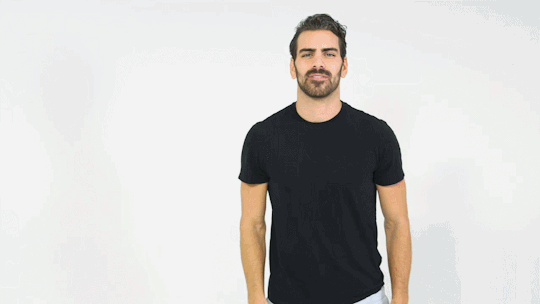
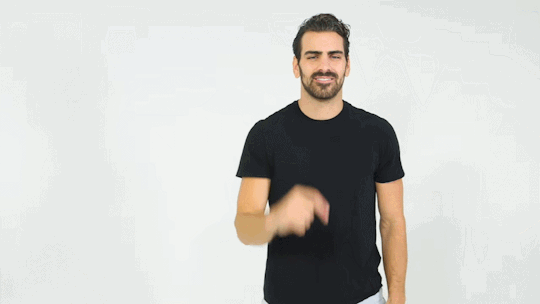



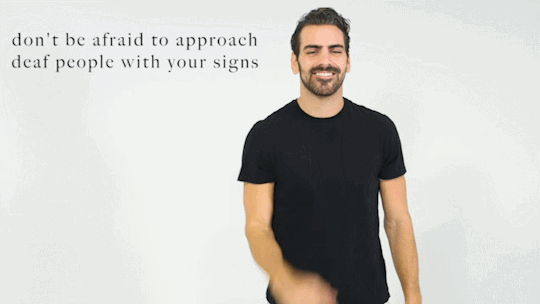
TOP 10 Basic ASL Signs For Beginners | Learn American Sign Language | Nyle DiMarco [x]
7K notes
·
View notes
Photo

Don’t blame me. This is automated. September 1, 2018 at 08:35AM Owner of this account: pepes-fantasies.tumblr.com
4 notes
·
View notes
Video
youtube
For Deaf Awareness Month, we celebrate and honor different identities within our communities.
from National Deaf Center on Postsecondary Outcomes
26 notes
·
View notes
